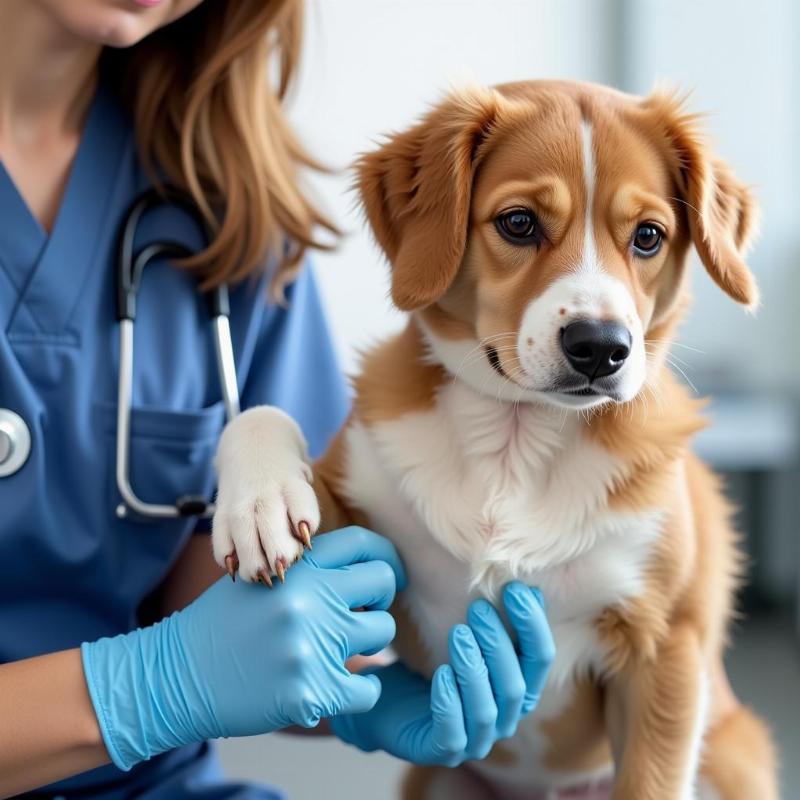If you’ve ever been woken up by the persistent slurping sound of your dog licking their paws at night, you’re not alone. This seemingly innocent behavior can be quite puzzling and even concerning for dog owners. Why do dogs lick their paws at night? Let’s delve into the various reasons behind this nighttime ritual, from simple grooming to more complex medical issues.
Possible Reasons for Nighttime Paw Licking
There are a multitude of reasons why your canine companion might be engaging in excessive paw licking at night. It’s important to remember that each dog is unique, and the cause can vary depending on their breed, age, and overall health. Here are some of the most common culprits:
-
Allergies: Environmental allergens like pollen, dust mites, or mold can irritate your dog’s paws, leading to itching and licking. Food allergies can also manifest as paw licking. If allergies are suspected, consider switching to a hypoallergenic diet and consulting your veterinarian.
-
Parasites: Fleas, ticks, and mites can cause intense itching, especially on the paws. Regularly check your dog for these pests and use preventative treatments as recommended by your veterinarian.
-
Dry Skin: Just like humans, dogs can suffer from dry, itchy skin, particularly during drier months. This can be exacerbated by frequent bathing or exposure to harsh chemicals.
-
Injury: A small cut, thorn, or embedded object can irritate your dog’s paw and lead to licking. Carefully examine their paws for any signs of injury.
-
Pain: Arthritis, joint pain, or nerve damage can cause discomfort in the paws, leading to licking as a coping mechanism. Senior dogs are more prone to these issues.
-
Boredom or Anxiety: If your dog isn’t getting enough physical and mental stimulation, they may resort to licking their paws out of boredom or anxiety, especially at night when they’re alone.
-
Behavioral Issues: In some cases, paw licking can become a compulsive behavior, similar to obsessive-compulsive disorder in humans. This often requires behavioral modification techniques and professional guidance.
-
Infections: Bacterial or fungal infections can cause itching and inflammation in the paws. These infections require veterinary attention and often topical or oral medications.
Is Paw Licking Serious?
While occasional paw licking is normal dog behavior, persistent and excessive licking can be a sign of an underlying problem. If your dog is licking their paws excessively at night, it’s crucial to consult your veterinarian to determine the cause and receive appropriate treatment.
When to See a Vet
- Licking is accompanied by redness, swelling, or discharge.
- Your dog is constantly licking their paws, even during the day.
- The licking is disrupting their sleep or causing hair loss.
- You suspect an injury or infection.
 Veterinarian Examining Dog's Paw
Veterinarian Examining Dog's Paw
Preventing and Managing Paw Licking
-
Regular Grooming: Keep your dog’s paws clean and dry. Trim the hair between their toes to prevent matting and moisture buildup.
-
Moisturizing Paw Balm: Apply a dog-specific paw balm to prevent dry and cracked skin, especially during dry weather.
-
Environmental Control: Minimize exposure to allergens by regularly cleaning your home and washing your dog’s bedding.
-
Parasite Prevention: Use flea and tick preventatives year-round as recommended by your veterinarian.
-
Enrichment and Exercise: Provide plenty of physical and mental stimulation to prevent boredom and anxiety. Consider puzzle toys, interactive games, and regular walks.
Conclusion
Understanding why your dog licks their paws at night is crucial for their overall well-being. By identifying the underlying cause and implementing appropriate preventative measures and treatments, you can help your furry friend enjoy peaceful, lick-free nights. Remember to consult your veterinarian for any persistent or concerning paw licking behavior.
FAQ
-
Q: Is it normal for dogs to lick their paws occasionally? A: Yes, occasional paw licking is part of normal grooming behavior.
-
Q: How can I tell if paw licking is a problem? A: Excessive licking, redness, swelling, hair loss, or behavioral changes are signs of a potential problem.
-
Q: What should I do if my dog is licking their paws excessively? A: Consult your veterinarian to determine the underlying cause and receive appropriate treatment.
-
Q: Can allergies cause paw licking? A: Yes, both environmental and food allergies can trigger paw licking.
-
Q: How can I prevent my dog from licking their paws? A: Address underlying issues like allergies, parasites, or dry skin, and provide adequate enrichment and exercise.
Beautdogs.us is your premier destination for all things dog-related in the United States. We offer expert advice on dog breeds, care, and products, empowering both new and experienced dog owners to provide the best possible care for their furry companions. We offer a wide range of resources and information, from breed-specific guides to product reviews and expert advice. Learn more about how to care for your giant breed dog and find the perfect dog boots or shoes to prevent slipping by visiting Beautdogs.us today! Contact us at [email protected] or call us at +1 501-555-7529.